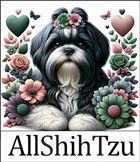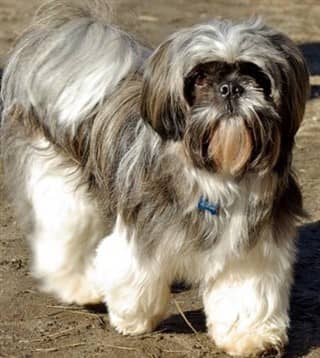Top 10 Senior Care Tips for Older Shih Tzu Dogs
Tip #1: Keep your Shih Tzu active.
You may have heard the saying, 'Use it or lose it', and this applies not just to people, but to senior dogs as well.
There is, of course, going to be gradual muscle degeneration throughout the senior years and also some level of osteoarthritis (more ahead) that may impede an older Shih Tzu's ability to exercise as they once did; but, these are also the reasons why it's vital that you keep your Shih Tzu moving.
Once you allow a senior dog to become sedentary, it can be difficult to get back to
regular exercise. So, don't stop. It's helps keep joints lubricated, can loosen stiffness associated with arthritis, slows age-related muscle atrophy, helps keep the immune system strong, and is good for the heart, among other things.
If there's been an injury, illness, or another reason for your older Shih Tzu's exercise taking a back seat, start things up again slowly, with vet approval.
Maintain the frequency (typically 2 walks per day) and adjust the pace and the duration, as needed.
Tip #2 Address arthritis issues.
Osteoarthritis (OA) is the single most common issue seen with senior dogs. In fact, at the young age of just 7 (3 years before the senior years start for this toy breed), 65% of canines have some level of osteoarthritis. By the age of 8, this spikes to a whopping 85%.
A big mistake in caring for a senior Shih Tzu is assuming that the symptoms of arthritis: a general 'slowing down', lethargy, difficulty rising from a down position, morning discomfort, and trouble sleeping, should just be accepted as a normal part of a dog aging. There are a lot
of treatment options to relieve inflammation, stiffness, and pain that goes along with this degenerative disease that eventually can structurally damage bones.
Options include joint supplements (details ahead), providing orthopedic support (details ahead), massage, heat application, and a range of medications including NSAIDs, steriods like prednisone, and Adequan injections.
Tip #3 Offer daily joint supplements.
With osteoarthritis (OA) being so common with senior dogs, certain dietary supplements for joint health should, ideally, be started around the 6-year mark as a preventative method. That said, anytime you can get your Shih Tzu on a daily regimen, even well into the senior years, it is going to help to some degree.
There are a number of supplements that work to counteract (but not cure) the decrease in lubrication in the joints and the wearing down of cartilage that is assocaied with OA . We recommend
Doggie Dailies Advanced Hip & Joint Supplement for Dogs

which is a blend of 6 effective ingredients: glucosamine, chondroitin, MSM, yucca schidigera, CoQ10 (coenzyme q10), and hyaluronic acid (HA).
Tip #4 Provide a warm, supportive bed.
There are a couple of reasons to reassess your senior Shih Tzu's sleeping arrangements. Seniors progressively require more sleep and getting quality sleep is vital for the body to refresh and restore.
Even dogs that sleep in their human's bed at night should have a supportive surface for daytime naps. And, even excellent beds wear down over time; most need to be replaced every 5 years or so.
Having good orthopedic support is vital to relieve pressure points, offer the right type of cushioning for the body, and provide warmth. Side bolsters are also excellent for providing good neck support which can cut down on snoring and other breathing disturbances that can interfere with sleep.
If you are picking out a bed for your senior Shih Tzu, be sure that it has at least a 2-inch thick memory-foam base with sturdy side bolsters. One that we recommend is the
K&H Ortho Bolster Sleeper

which has 3-inch medical-grade orthopedic memory-foam, as well as a super-soft micro-fleece cover.
Tip #5 Be aware of age-related hearing loss.
Senior Shih Tzu dogs typically start having some age-related hearing issues around the age of 13 years old. This can worsen rather quickly; many seniors in their early to mid-teens have significant hearing loss in one or both ears.
Note that canine hearing aides do exist, but at the time of this writing, they are extraordinary expensive, unreliable, are not proven to improve hearing all that much, and are rarely tolerated.
For this reason, there is nothing viable that can reverse this or cure age-related deafness; but, it's good to be aware of this issue in order to make a few changes. Signs that an older dog is having trouble include not responding to their name or to commands and/or being startled when approached.
A vet exam should rule out other issues that can mimic hearing loss, such as ear infections.
To help a senior that's having trouble, you can start to incorporate hand signals along with commands and turn lights on and off before entering rooms. Try to approach your Shih Tzu from the front or side, not the back.
Tip #6 Know about age-related vision issues.

